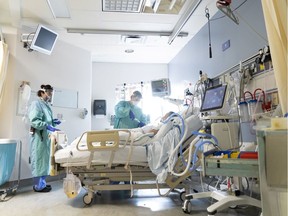"Why does Vancouver Coastal Health need 10 vice presidents when the United States can get by with one?' asked Cambie Surgery Centre founder Dr. Brian Day

Trimming bureaucracy, recruiting and training more workers and implementing a new way to manage wait-lists were among solutions offered by a Vancouver Sun panel of experts on Tuesday night brought together to help solve B.C’s health care crisis.
The panel was held just a week after two dozen medical specialists sent a letter to Minister of Health Adrian Dix saying there were an estimated one million patients waiting to see a specialist, and as fewer British Columbians have access to a family doctor and pressure grows on emergency rooms.
Start your day with a roundup of B.C.-focused news and opinion delivered straight to your inbox at 7 a.m., Monday to Friday.
Thanks for signing up!
A welcome email is on its way. If you don't see it, please check your junk folder.
The next issue of Sunrise presented by Vancouver Sun will soon be in your inbox.
The panel of speakers ran the full gamut of health care; including Ambulance Paramedics of B.C. president Troy Clifford, Royal Columbian Hospital emergency room doctor Ali Abdalvand, B.C. Nurses’ Union president Aman Grewal, B.C. Care Providers Association CEO and former B.C. Liberal health minister Terry Lake, and Cambie Surgery Centre founder Dr. Brian Day.
Vancouver Sun political columnist Vaughn Palmer set the scene, explaining that provincial health care had been a hot topic since he started as a political columnist in 1984, when experts were already warning of the impact an aging population would have on the system.
“They knew it was coming and have found ways to make it worse,” Palmer said.
The B.C. government is expected to spend $25.5 billion on health care this year, increasing to $27 billion by 2024/25.
Day said the amount of money being spent was not the problem, but how it was being spent, in particular on a growing bureaucracy that does not provide direct health care services.
Day joked that he was once asked to run for parliament and become Minister of Health. He said that he told the person that it wouldn’t work, because the first thing he would do is close the Ministry of Health and direct the Ministry of Finance to send all the health budget directly to hospitals.
“That would save $1 billion,” Day said. “Why does Vancouver Coastal Health need 10 vice presidents when the United States can get by with one? With a monopoly bureaucracy has expanded and it’s not going to end.”
Day is in favour of a two-tier health care system.
Clifford said the ambulance system had also suffered under increased bureaucracy since it became a health care agency in 2013.
All panelists agreed that lack of staff and staff leaving the professions was at the root of the system’s problems, coupled with the aging population. The panel heard that many respiratory therapists had left the province over the past two years – some going to Alberta where they were paid 20 per cent more.
Clifford said that on any given day 25 per cent of ambulances had no staff to operate them.
He said that there were significantly more calls over the past few years because there were “more, sicker people” in the community, due in part to the aging population.
Grewal said there were 4,265 nursing vacancies in the province. She had just returned from a tour of the north-east of B.C. where she saw hospitals operating at 50 per cent staff levels.
“We don’t have enough nurses and we need to retain them,” she said, adding she was in favour of restoring two-year nursing diplomas to complement four-year degree programs.
The B.C. government has opened up 6,000 more nurse training spaces.
Lake said that his aged-care sector was also struggling to get staff.
“We can’t find nurses and care-aids. There just are not enough people out there,” said Lake, who thinks the province should be more open to nursing staff and midwives who are trained overseas.
He said that as people live longer and the percentage of people in the population are older there will be greater pressure brought to bear on politicians to spend more on health.
All agreed that while COVID-19 highlighted the problems in the health care system, the problems had been a long time coming.
Abdalvand said that emergency departments were relatively new to health care and that the pressure in these units was growing all the time. He said all units in the health care system had to be better integrated, but if one faltered they all felt it.
B.C’s 2022 budget promised new urgent and primary care centres, reduced waiting times for surgery and diagnostic imaging and speeding up emergency response times for paramedics.
Palmer offered an innovative solution to the wait-list crisis. He suggested that legislation be created that would establish a set of acceptable wait-times for various procedures and once the wait time had been breached the government would dip into its contingency fund and increase capacity to do the needed surgeries. He said this year alone the government had a contingency fund of $1 billion.
dcarrigg@postmedia.com


